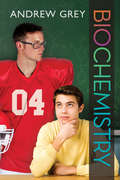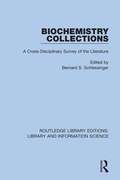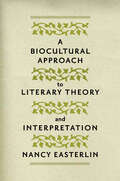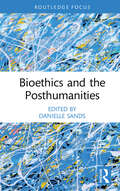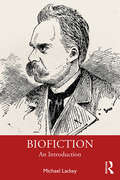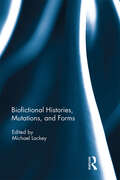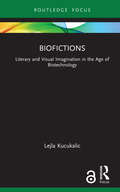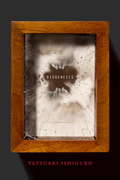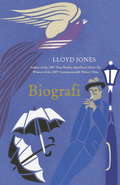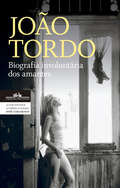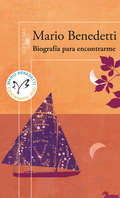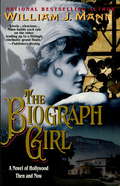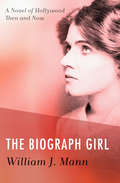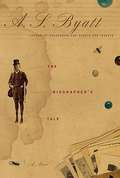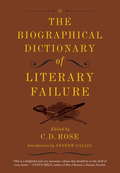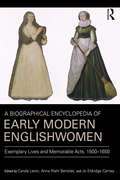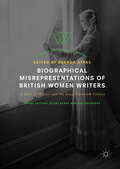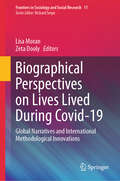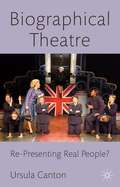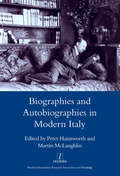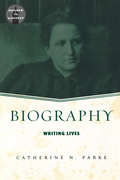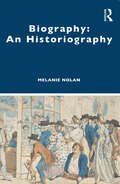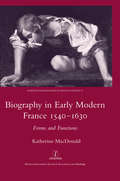- Table View
- List View
Biochemistry (Chemistry Series #2)
by Andrew GreySequel to Organic ChemistryChemistry: Book TwoWhen his college biochemistry class turns out to be much more difficult than star quarterback Freddie Samuelson imagined, his lab partner, Kurt Maxwell, agrees to help. They're very different: a rich kid athlete and a hardworking openly gay scholarship student. But Kurt slips past Freddie's defenses, and little by little--despite Freddie ignoring his own sexuality in the past--Freddie realizes he wants to get to know Kurt, especially when Kurt helps him through more challenges than their science class. But it isn't long before rumors begin to fly, and the obstacles Freddie will face may block him from both the future he planned on and the future he didn't know he wanted.
Biochemistry Collections: A Cross-Disciplinary Survey of the Literature (Routledge Library Editions: Library and Information Science #10)
by Bernard S. SchlessingerThis book, first published in 1982, offers an examination of the special nature of biochemistry collections. It focuses on the production, control, and use of the literature – diverse in nature, and analysed here by specialist contributors.
A Biocultural Approach to Literary Theory and Interpretation
by Nancy EasterlinCombining cognitive and evolutionary research with traditional humanist methods, Nancy Easterlin demonstrates how a biocultural perspective in theory and criticism opens up new possibilities for literary interpretation.Easterlin maintains that the practice of literary interpretation is still of central intellectual and social value. Taking an open yet judicious approach, she argues, however, that literary interpretation stands to gain dramatically from a fair-minded and creative application of cognitive and evolutionary research. This work does just that, expounding a biocultural method that charts a middle course between overly reductive approaches to literature and traditionalists who see the sciences as a threat to the humanities.Easterlin develops her biocultural method by comparing it to four major subfields within literary studies: new historicism, ecocriticism, cognitive approaches, and evolutionary approaches. After a thorough review of each subfield, she reconsiders them in light of relevant research in cognitive and evolutionary psychology and provides a textual analysis of literary works from the romantic era to the present, including William Wordsworth’s "Simon Lee" and the Lucy poems, Mary Robinson’s "Old Barnard," Samuel Taylor Coleridge’s "Dejection: An Ode," D. H. Lawrence’s The Fox, Jean Rhys’s Wide Sargasso Sea, and Raymond Carver’s "I Could See the Smallest Things."A Biocultural Approach to Literary Theory and Interpretation offers a fresh and reasoned approach to literary studies that at once preserves the central importance that interpretation plays in the humanities and embraces the exciting developments of the cognitive sciences.
Bioethics and the Posthumanities
by Danielle SandsThis interdisciplinary volume explores how posthumanist approaches can illuminate current issues in bioethics and explores the relevance of these issues for the humanities, including questions of autonomy and authorship, and notions of ethical and juridical responsibility in the context of a changing understanding of subjectivity. With contributions from a variety of areas, including literature, philosophy, media, and policy-making, the book outlines the historical and philosophical development of posthumanism, and current key questions in bioethics. It generates a dialogue between bioethical approaches and the posthumanities, identifying ways in which posthumanist scholarship might be used to inform bioethical policy. The book also looks more speculatively at the future, and the potential implications of technological developments which are only beginning to emerge. It uses posthumanism to look critically at the humanism underpinning de-extinction science, considers the ways in which technology is re-framing our social and political imaginaries, and asks about the identification of future posthumans.
Biofiction: An Introduction
by Michael LackeyBiofiction: An Introduction provides readers with the history, origins, evolution, and legitimization of biofiction, suggesting potential lines of inquiry, exploring criticisms of the literary form, and modeling the process of analyzing and interpreting individual texts. Written for undergraduate and graduate students, this volume combines comprehensive coverage of the core foundations of biofiction with contemporary and lively debates within the subject. The volume aims to confront and illuminate the following questions: • When did biofiction come into being? • What forces gave birth to it? • How does it uniquely function and signify? • Why has it become such a dominant aesthetic form in recent years? This introduction will give readers a framework for evaluating specific biofictions from writers as varied as Friedrich Nietzsche, George Moore, Zora Neale Hurston, William Styron, Angela Carter, Joyce Carol Oates, and Colm Tóibín, thus enabling readers to assess the value and impact of individual works on the culture at large. Spanning nineteenth-century origins to contemporary debates and adaptations, this book not only equips the reader with a firm grounding in the fundamentals of biofiction but also provides a valuable guide to the uncanny power of the biographical novel to transform cultural attitudes, perspectives, and beliefs.
Biofictional Histories, Mutations and Forms
by Michael LackeyBiofiction, defined as literature that names its protagonist after an actual historical figure, first became popular in the 1930s, but over the last forty years it has become a dominant literary form. Prominent writers such as J.M. Coetzee, Joyce Carol Oates, Russell Banks, Julia Alvarez, Peter Carey, Hilary Mantel, Colm Tóibín, Anne Enright, Colum McCann, and Michael Cunningham have authored spectacular biographical novels which have won some of the world’s most prestigious awards for fiction. However, in spite of the prominence of these authors, works, and awards, there has been considerable confusion about the nature of biofiction. This collection of process pieces and academic essays from authors and scholars of biofiction defines the nature of the aesthetic form, clarifies why it has come into being, specifies what it is uniquely capable of signifying, illustrates how it pictures the historical and critiques the political, and suggests potential directions for future studies. This book was originally published as a special issue of a/b: Auto/Biography Studies.
Biofictions: Literary and Visual Imagination in the Age of Biotechnology (Routledge Focus on Literature)
by Lejla KucukalicBiofictions introduces three novel concepts: ‘biofiction,’ ‘bioimagination,’ and ‘biodiscourse’ to talk about intersections of literary and visual texts and biotechnology. The book proposes a new interdisciplinary area of research that correlates processes of genetics and literature, based on two critical approaches. One, drawing parallels between the genetic codes, human language, formal (binary) language and posthuman communication and the role of meaning and imagination in these forms of communication. Two, by defining "biofictions" as a critical scientific-artistic concept and as a corpus of texts that engage ideas and developments in molecular biology. Syncretic connection between biotechnology and literature is especially evident in an open science movement and a literary artistic genre of biopunk, discussed across chapters. The study includes well-known contemporary texts such as David Foster Wallace’s Infinite Jest, that are re-contextualized as biofiction, it offers a re-reading of important but neglected novels such as Thomas Disch’s Camp Concentration (1967) and it analyzes new visual texts such as the TV series Altered Carbon and Ghost in the Shell films. Based on these wide-ranging examples and new critical concepts, the book argues that coming up with possible alterations for the genetic code or intended traits for the organism is a discursive practice that brings into being bio-narratives that are both organic and literary. Chapter 1 of this book is freely available as a downloadable Open Access PDF under a Creative Commons Attribution-Non Commercial-No Derivatives 4.0 license.
Biogenesis
by Tatsuaki IshiguroTold in the manner of scientific reports, this collection of science fiction stories explores the allegorical overtones about the precariousness of species. Biogenesis and Other Stories collects five stories by Tatsuaki Ishiguro.In Biogenesis, two professors research the rare winged mouse and how the genetic makeup of the creatures pointed to their eventual extinction. The discover that upon mating, both the male and female of the species died. The professors try to clone the winged mice without success, so they breed the remaining pair in captivity, noting the procedure, which includes a vibration of the creatures' wings, what appeared to be kissing, and the shedding of tears--composed of the same substance as their blood--until their eventual death.
Biografi
by Lloyd JonesWhen Biografi was first published, it was met first with enormous critical acclaim - only to become the centre of a heated controversy. Was it fact or fiction? Had Lloyd Jones concocted his story of life in the new Albania? Or was it travel literature as its publishers insisted? Equal parts travelogue, political reportage and bizarre mystery novel, Lloyd Jones crosses Albania as it reinvents itself - a volatile, surreal wonderland where nothing is quite as it seems.
Biografia involuntária dos amantes
by João Tordo<P><P> Numa estrada adormecida da Galiza, dois homens atropelam um javali. A visão do animal morto na estrada levará um deles - Saldaña Paris, um jovem poeta mexicano de olhos azuis inquietos - a puxar o primeiro fio do novelo da sua vida. Instigado pelas confissões desconjuntadas do poeta, o seu companheiro de viagem - um professor universitário divorciado - irá tentar descobrir o que está por trás da persistente melancolia de Saldaña Paris. <P><P>A viagem de descoberta começa com a leitura de um manuscrito da autoria da ex-mulher do mexicano, Teresa, que morreu há pouco tempo e marcou a vida do poeta como um ferro em brasa. O narrador não poderia adivinhar (porque nunca podemos saber as verdadeiras consequências dos nossos actos) que a leitura desse manuscrito teria o mesmo efeito sobre a sua vida. <P><P>As páginas escritas por Teresa revelam a sua adolescência no seio de uma família portuguesa contaminada pela desilusão: um pai ausente e alcoólico, um tio aventureiro e misterioso, uma mãe demasiado protectora. Mas o que ressalta com maior vivacidade daquelas páginas é o relato enternecedor do seu primeiro amor, ao mesmo tempo que começam a insinuar-se na sua vida realidades grotescas e brutais. Confrontado pela primeira vez com a suspeita dessa terrível possibilidade, Saldaña Paris mergulha numa depressão profunda. <P><P>Determinado em libertar o amigo do poder corrosivo do mal, o nosso narrador compõe então, peça a peça, a biografia involuntária dos dois amantes. Uma biografia que passa pelo desvelar do passado, para que este não contamine irremediavelmente o futuro. Nesta dupla tentativa de salvação (a do amigo mas também a sua própria), o professor irá procurar encontrar «as coisas certas» queainda nos definem como humanos e resgatar a possibilidade de um futuro com dias felizes.
Biografía para encontrarme
by Mario BenedettiEl libro inédito de Mario Benedetti (1920-2009). Benedetti seleccionó y preparó la edición de estos poemas a lo largo de sus últimos meses de vida. «Cuando la poesía abre sus puertas es como si cambiáramos de mundo.» Durante los dos últimos años de su vida, Mario Benedetti corrigió, reescribió y ordenó estos sesenta y dos poemas. Biografía para encontrarme nos invita a descubrir o reencontrarnos con la esencia literaria del escritor uruguayo, a través de su poesía más íntima y conmovedora. Sus versos conjuran el poder de un mar sobrecogedor, evocan la tímida luz de una madrugada incierta o dibujan el mapa de la melancolía universal. La selección de poemas, que el maestro uruguayo dejó lista para ser entregada a sus editores, recorre los motivos poéticos más significativos del escritor: soledad, nostalgia, muerte, amor, belleza, desarraigo... Benedetti en estado puro
The Biograph Girl
by Mann William J.Grab your seat for a wild roller-coaster ride through the 20th century, led by a sassy, chain-smoking 107-year-old actress named Florence Lawrence. Masterfully blending fact with fiction, award-winning author William J. Mann has reimagined this very real historical figure. From her vaudeville childhood as Baby Flo, The Child Wonder Whistler to the snowy Bronx backlot where she shot her first motion picture, the lovely Florence commanded--and demanded--attention. By 1910, she was the legendary, enigmatic Biograph Girl, hounded by shrieking fans and blinding flashbulbs--the world's very first movie star. Yet, inevitably, the rabid interest in her faded--far too soon for a girl whose true identity had been lost amidst the glamorous trappings of Hollywood's glowing dawn. Reduced to MGM walk-on roles, a bedraggled, forgotten Lawrence finally ended her life in 1938 with a lethal ingestion of ant paste. . . or did she? Sixty years later, the fiercely competitive Sheehan twin brothers, Richard and Ben, discover a feisty, mysterious old lady named Flo Bridgewood telling tales of the McKinley assassination and the sinking of the Titanic. The twins share little more in common than identical features and a burning ambition to succeed. Muscular golden boy Richard is a gay journalist with too many credit cards and an unproduced screenplay in his drawer. Rebellious Ben is a notorious womanizer and independent filmmaker whose one success a decade ago was supposed to be his ticket to fame. Neither suspects that a chance meeting is about to launch them into a mystery-shrouded journey that spans not just an entire century, but one woman's remarkable life--and supposed death. . . Seamlessly combining actual people with fictional characters, Mann presents a wonderfully entertaining look at the ups and downs of the life of a star and of the film world, from its inception to the present day. --Booklist
The Biograph Girl: A Novel of Hollywood Then and Now
by William J. MannAward-winning author William J. Mann blends fact and fiction in this unconventional novel about the nature of celebrity The Biograph Girl is Florence Lawrence, who gets her first big break in vaudeville as a tiny tot who can whistle like a man. By 1910 she&’s a legendary movie star, pursued by thousands of rabid fans. Just a few short decades later, she&’s all but forgotten, reduced to walk-ons at MGM. In 1938 she kills herself by ingesting a lethal dose of ant paste. Fast-forward fifty-nine years. A 107-year-old woman named Flo Bridgewood is discovered in a Catholic nursing home in Buffalo. Could the feisty chain smoker with the red satin bow in her hair be America&’s former sweetheart? Florence Lawrence is dead . . . isn&’t she? And if not, then whose body is in her grave? That&’s what journalist Richard Sheehan wants to find out as he and his identical twin brother, Ben, a documentary filmmaker, decide to cash in on a decades-old mystery. Sharing the stage is Flo herself, whose story is the stuff of Hollywood fantasy. A provocative melding of fact and fiction, The Biograph Girl is about what it means to be a celebrity—then and now.
The Biographer's Tale
by A. S. ByattFrom the award-winning author of Possession comes an ingenious novel about love and literary sleuthing: a dazzling fiction woven out of one man's search for fact.Here is the story of Phineas G. Nanson, a disenchanted graduate student who decides to escape the world of postmodern literary theory and immerse himself in the messiness of "real life" by writing a biography of a great biographer. In a series of adventures that are by turns intellectual and comic, scientific and sensual, Phineas tracks his subject to the deserts of Africa and the maelstrom of the Arctic. Along the way he comes to rely on two women, one of whom may be the guide he needs out of the dizzying labyrinth of his research and back into his own life. A tantalizing yarn of detection and desire, The Biographer's Tale is a provocative look at "truth" in biography and our perennial quest for certainty.From the Trade Paperback edition.
The Biographical Dictionary of Literary Failure
by C. D. Rose Andrew GallixA darkly comic, satirical reference book about writers who never made it into the literary canonA signal event of literary scholarship, The Biographical Dictionary of Literary Failure compiles the biographies of history's most notable cases of a complete lack of literary success. As such, it is the world's leading authority on the subject.Compiled in one volume by C. D. Rose, a well-educated person universally acknowledged in parts of England as the world's pre-eminent expert on inexpert writers, the book culls its information from lost or otherwise ignored archives scattered around the globe, as well as the occasional dustbin.The dictionary amounts to a monumental accomplishment: the definitive appreciation of history's least accomplished writers. Thus immortalized beyond deserving and rescued from hard-earned obscurity, the authors presented in this historic volume comprise a who's who of the talentless and deluded, their stories timeless litanies of abject psychosis, misapplication, and delinquency.It is, in short, a treasure.
A Biographical Encyclopedia of Early Modern Englishwomen: Exemplary Lives and Memorable Acts, 1500-1650
by Carole Levin Anna Riehl Bertolet Jo Eldridge CarneyFrom the exemplary to the notorious to the obscure, this comprehensive and innovative encyclopedia showcases the worthy women of early modern England. Poets, princesses, or pirates, the women of power and agency found in these pages are indeed worth knowing, and this volume will introduce many female figures to even the most established scholars in early modern studies. Rather than using the conventional alphabetical format of the standard biographical encyclopedia, this volume is divided into categories of women. Since many women will fit in more than one category, each woman is placed in the category that best exemplifies her life, and is cross referenced in other appropriate sections. This structure makes the book an interesting read for seasoned scholars of early modern women, while students need not already be familiar with these subjects in order to benefit from the text. Another unusual feature of this reference work is that each entry begins with some incident from the woman’s life that is particularly exciting or significant. Some entries are very brief while others are extensive. Each includes a source listing. The book is well illustrated and liberally sprinkled with quotations of the time either by or about the women in the text.
Biographical Misrepresentations of British Women Writers: A Hall of Mirrors and the Long Nineteenth Century (Palgrave Studies in Life Writing)
by Brenda AyresThis book is an investigation of the biases, contradictions, errors, ambiguities, gaps, and historical contexts in biographies of controversial British women who published during the long nineteenth century, many of them left unchecked and perpetuated from publication to publication. Fourteen scholars analyze the agenda, problems, and strengths of biographical material, highlighting the flaws, deficiencies, and influences that have distorted the portraits of women such as Lady Mary Wortley Montagu, Mary Wollstonecraft, Mary Hays, Sydney Owenson, Letitia Elizabeth Landon, Felicia Hemans, Elizabeth Barrett Browning, Caroline Norton, Elizabeth Gaskell, Charlotte Bront#65533;, Lady Florence Dixie, George Eliot, and Edith Simcox. Through exposing distortions, this fascinating study demonstrates that biographies are often more about the biographer than they are about the biographee and that they are products of the time in which they are written.
Biographical Perspectives on Lives Lived During Covid-19: Global Narratives and International Methodological Innovations (Frontiers in Sociology and Social Research #11)
by Lisa Moran Zeta DoolyThis volume elucidates international biographical and narrative perspectives on how COVID-19 influenced people’s daily lives across different countries and contexts. It draws together global interdisciplinary scholarly contributions and conceptualizes the lived life as a complex, multilayered and multidimensional phenomenon that is constantly unfolding both in and across time. Significantly, this volume focuses on seldom-heard groups including persons diagnosed with HIV, COVID-19 dissenters, prisoners, essential workers, waste pickers, refugees and migrants. The chapters focus on the pandemic's multifarious impacts on people’s lived realities in personal and professional domains, exploring the complexity of people’s relationships with family, friends, interactions with colleagues and students and the centrality of emotions, to everyday human experiences, including grief, loss and loneliness as well as moments of joy and processes of personal renewal. This volume explores innovative questions, issues and challenges on the development and utilization of rich, biographical narrative methodologies during COVID-19, addressing important issues like power and voice, and pragmatic questions of how to do biographic research whilst socially distant. Contributions to this work illuminate the multidimensionality of human experiences, adaptability to adverse circumstances and the complexity of working through unanticipated global events whilst reimagining novel social futures.
Biographical Theatre
by Ursula CantonMarilyn Monroe, Vincent van Gogh or the victims of rendition flights - the number and variety of historical and contemporary figures represented on British stages is amazing. This book develops a new theoretical framework for the representation of real life figures on stage and examines different ways in which they can be included in performances.
biographie d'une femme orientale
by Foued BessaadHistoire d'une femme en liberté, d'une société orientale reliée au pouvoir des traditions masculines, une femme qui a fait un long voyage qui a duré trente ans pour se retrouver :: un être humain qui a ses propres sentiments vivre en toute indépendance, une femme qui crée son propre destin. C'est une question de conscience et de volanté. Une histoire qui apprend aux femmes que la solution a trouvé est un interprète, mais ce n'est pas seulement l'exterieur qu'il faut chercher et ce n'est qu'une question de temps, ni plus, moins.
Biographies and Autobiographies in Modern Italy: a Festschrift for John Woodhouse
by Martin McLaughlin"Critical interest in biography and autobiography has never been higher. However, while life-writing flourishes in the UK, in Italy it is a less prominent genre. The twelve essays collected here are written against this backdrop, and address issues in biographical and autobiographical writing in Italy from the later nineteenth century to the present, with a particular emphasis on the interplay between individual lives and life-writing and the wider social and political history of Italy. The majority of essays focus on well-known writers (D'Annunzio, Svevo, Bontempelli, Montale, Levi, Calvino, Eco and Fallaci), and their varying anxieties about autobiographical writing in their work. This picture is rounded out by a series of studies of similar themes in lesser known figures: the critic Enrico Nencioni, the Welsh-Italian painter Llewellyn Lloyd and Italian writers and journalists covering the Spanish Civil War. The contributors, all specialists in their fields, are Antonella Braida, Charles Burdett, Jane Everson, John Gatt Rutter, Robert Gordon, Gwyn Griffith, Peter Hainsworth, Martin McLaughlin, Gianni Oliva, Giuliana Pieri, and Jon Usher. The volume is dedicated to John Woodhouse, on his seventieth birthday, and concludes with a bibliography of his writings."
Biography: Writing Lives (Genres In Context Ser.)
by Catherine N. ParkeCatherine Parke explores biography through detailed examinations of Samuel Johnson, Virginia Woolf, Langston Hughes, Gertrude Stein and other masters of the genre.
Biography (The Critical Idiom Reissued #32)
by Alan ShelstonFirst published in 1977, this book explores biography in the post-Renaissance period and investigates some of the problems implicit in this literary form. The introduction considers various aspects of biographical theory as expressed by practitioners and critics. The rest of the book is a detailed examination of specific works placed in chronological context — reflecting the author’s assertion that a work of biography is inseparable from the intellectual and cultural precepts of its age. Amongst the works examined are: Plutarch’s Lives, Aubrey’s Brief Lives, Boswell’s Life of Johnson, and Johnson’s Life of Savage. This book will be of interest to students of literature and cultural history.
Biography: An Historiography
by Melanie NolanBiography: An Historiography examines how Western historians have used biography from the nineteenth century to the present – considering the problems and challenges that historians have faced in their biographical practice systematically. This volume analyses the strategies and methods that historians have used in response to seven major issues identified over time to do with evidence, including but not limited to the problem of causation, the problem of fact and fiction, the problem of other minds, the problem of significance or representativeness, the problems of perspective, both macro and micro, and the problem of subjectivity and relative truth. This volume will be essential for both postgraduates and historians studying biography.
Biography in Early Modern France, 1540-1630: Forms and Functions
by Katherine MacDonald"When the famous Royal Professor of Philosophy and Eloquence Petrus Ramus (1515-1572) gave a lecture, one of his most promising pupils stood by, ready to tug on his coat if he made a mistake. That pupil was Ramus's future biographer, the much less famous Nicolas de Nancel (1539-1610), who recounted this anecdote in hisVita Rami (1599). Nancel's insertion of himself into his life of Ramus is typical of early modern biographies of men of letters. As biographer, the humanist man of letters situated himself within the same cultural field as his subject, thereby accrediting himself as a fellow man of letters by his display of humanistic competence. The first study of monograph lives of men of letters in sixteenth-century France, this ground-breaking book offers valuable insights into biography's role as a form of social and cultural negotiation geared to advance the biographer's career."
